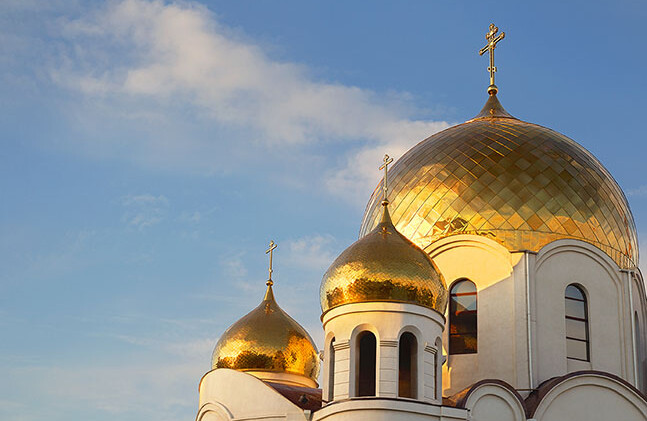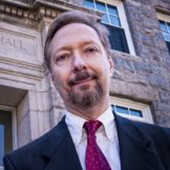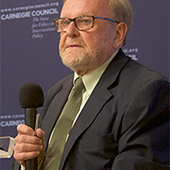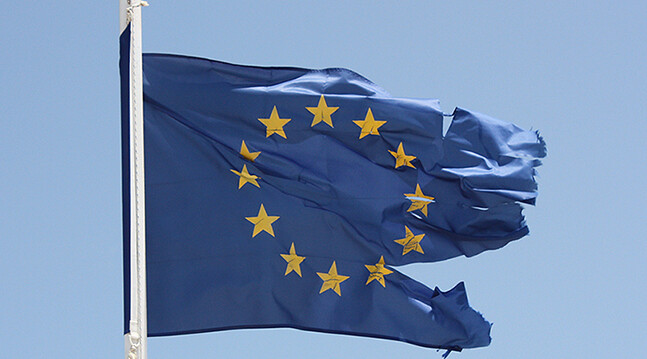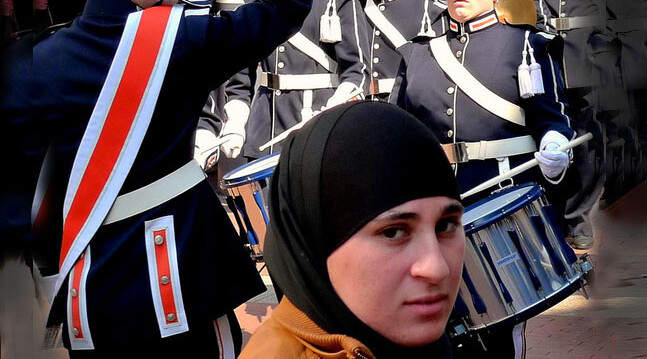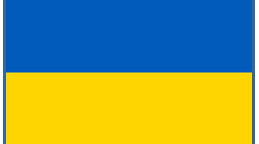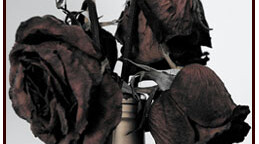This is the third in a series of Security Bulletins on the crisis in Ukraine, and here Dr. Nicolai N. Petro gives us a view from beyond Kiev, from Odessa in the country's South. He explains the various political factions and warns about the danger of right-wing nationalism--not overnight, perhaps, but over the long term.
DAVID SPEEDIE: Nicolai, welcome to the Carnegie Council.
NICOLAI PETRO: Hello, David. How are you?
DAVID SPEEDIE: I'm very well, thanks.
Let's get right to the heart of the matter, Nicolai. There are new and dramatic and disturbing, and sometimes tragic, headlines from Ukraine every day—protesters and police fatalities, truces that are broken, army chiefs sacked. It's a very dramatic picture. However, much of what we get in the West is, of course, coming from the prism of Kiev.
You are in the South, in Odessa. Can you give us a sense of what the view is from where you are?
NICOLAI PETRO: Yes. The situation is indeed different in each of the regions. And, perhaps not surprisingly, the pattern of violence seems to split along the electoral pattern that we have seen repeated through each election cycle.
There seems to be a core in the Western regions and part of the Central regions that favor a more pro-Western orientation for their policy, and certainly support more of a Ukrainian vision of the country. And in the East and the South we have regions that are closer culturally, spiritually, and probably politically as well, to Russia.
I should stress, however, that both sides within this single nation, although they represent different cultural and religious and linguistic backgrounds, consider themselves to be thoroughly Ukrainian patriots and they would like to be able to live together, so long as they can resolve these current political conflicts.
DAVID SPEEDIE: Specifically, however, the scenes in Kiev, are they being replicated in Odessa in any way?
NICOLAI PETRO: The scenes in Kiev, the violence against government forces and government buildings, have been replicated in certain cities in the Western regions and as far east as Opava, which is just a few hours east of Kiev. But the rest of the country has reacted, the East and the South, very negatively to this sort of behavior and has, indeed, rallied in each region behind, not just the government, but, in the face of the government's inaction, they have begun to form vigilante self-defense groups to try to prevent the what they consider incursions from the West into their regions. That's certainly true here.
Whereas in the West the political establishment has rallied behind the opposition, in the East and the South we see instead governors calling for the introduction of martial law in Kiev and the restoration as soon as possible of law and order there.
DAVID SPEEDIE: Well, when you speak of vigilante groups stepping into a sort of government vacuum as it were, Nicolai, you seem to be indicating a pretty dire situation. I guess it was last week, former president Kravchuk spoke of Ukraine being on the brink of civil war. Is that something that you see as being an accurate assessment?
You have also expressed the opinion that martial law, while leading perhaps to more deaths and violence, it's hard to imagine how law and order can be restored without it. Again, is that still something you adhere to?
NICOLAI PETRO: With respect to civil war, I actually don't see civil war as a likely outcome for two reasons.
If the violence ends, or is somehow subdued, then the country will muddle along. Maybe the sides won't be happy with each other, but they will have worked out some way to shift the conflict to a rhetorical one rather than a physical confrontation. That will allow at least for the country to—as I say, muddle along is the best image I can conjure up for it.
If, however, the violence and lawlessness escalate, then I don't really see why either side in this debate, given their fairly stringent positions and values that they associate with those positions, why they would want to live together. In other words, for a civil war to occur, one side has to want to coerce the other side or conquer the other side. I think at that point, if the violence escalates, the East will not want to be with the West and the Western parts will simply say, "Well, those Easterners are just Muscovite slaves, or something, and let them go wherever they want to."
Or there could be conflict over which regions in the middle go where, because there are regions that are fairly closely split. But there aren't that many of them actually. We're only talking about maybe Kiev itself, which has a symbolic significance, and one or two other regions out of more than 20.
DAVID SPEEDIE: Again with regard to the political leadership vacuum, I read somewhere this afternoon that President Yanukovych does not have time to look at the pictures of the demonstrations.
But let's look beyond the immediate timeframe and the political opposition, the likely candidates to emerge on the scene in any leadership capacity. There is Mr. Yatsenyuk, who is the parliamentary leader of the Fatherland party [Batkivshchyna], and of course who is an ally of Ms. Tymoshenko, who is incarcerated. There is the former boxing champion, Mr. Klitschko with the Ukrainian Democratic Alliance for Reform [UDAR]. And then there is Mr. Tyahnybok of Svoboda, the rightist organization.
Guide us through a little bit of these opposition leaders and what their role is in the current situation.
NICOLAI PETRO: Those three parties form what they call the "united opposition." Having said that, it is important to stress, and each of them individually stresses, that after these events, the purpose of which is to remove the president and establish a new parliamentary majority—after that, they will again be at each other's throats because there is nothing that unites them.
And even within the Batkivshchyna party, there is a deep rivalry between Mr. Yatsenyuk and Ms. Tymoshenko. There was a big scandal here not long ago with a letter that she wrote, which seemed to imply that Mr. Yatsenyuk is not exactly necessarily the prime candidate for any presidential position in the future and she can think of other people, namely like herself, who would be much better suited. So with respect to Yatsenyuk and Batkivshchyna, they have their agenda.
The UDAR party is the latest and the least known addition to Ukrainian politics. Its political agenda is equally amorphous. It simply seems to be a gathering of people who don't like any of the other existing parties.
And then there is Mr. Tyahnybok's party, or as it's called the "national movement," which is called "freedom" (Svoboda). There is quite a bit of debate about how to characterize Mr. Tyahnybok's party. Without going into whether the appropriate nomenclature is right wing or just nationalist or fascist, let me say that there is a resolution of the European Parliament of November 13, 2012, which specifically asks for all of the other political parties in Ukraine to disassociate themselves from Svoboda because of its "racist, anti-Semitic, and xenophobic politics."
So that's the coalition as it stands.
There are no—I was thinking about this just today—there really are no ideological parties in the Ukrainian political spectrum, with two exceptions. One is the Communist Party, who have their well-established ideology.
The other now, a recent addition to the latest parliament, is Svoboda. They are, for want of a better term, a nationalist party whose agenda is a new social order. As he mentioned recently on an interview I saw, they are ideological opponents of liberalism, and their agenda is to have a resurgence of the Ukrainian nation around authentic Ukrainian values.
The rest of the parties, including Batkivshchyna, including the Party of Regions, the current largest party in parliament, the president's party, and UDAR, are simply a convenient grouping of political elites from various regions of the country who do not have any clear ideological allegiance.
So one of the problems that we have in trying to understand, as some do, who should we support in Ukraine is that we have nationalists, we have communists, and then we have a big mass of individuals and groups that have no particular allegiance to any ideology. They are not liberals and there is no liberal party here. That makes it very difficult to know which side is really the preferable one for the kind of long-term democratic, liberal evolution that many people hope for in the Ukraine.
DAVID SPEEDIE: That speaks again to the overly simplistic reporting, I think, that one sees, even in the relatively responsible Western press, the idea that the people we see in the main square in Kiev are the sort of liberal freedom fighters, it's a black/white situation.
You wrote recently in The National Interest a very interesting piece, where you said, and I quote: "By the end of December, the issue of EU accession was already all but irrelevant. The rallying cry of the opposition is now national revolution spearheaded by racial nationalists who had always opposed European integration because it would dilute their idea of nationhood and force Ukraine into what they call 'the global concentration camp.'" Then you go on to say: "The key actors in Ukrainian politics are not invested in the political system."
So, at the very least, it seems to be a much more complex situation than "support the people in Kiev, the protesters in Kiev, and we will lead Ukraine to the liberal democratic promised land."
NICOLAI PETRO: Yes. I was taken to task a bit earlier today on the use of the term "radicals." The person I was discussing this with said that the people who are protesters are not all radicals. That makes sense to me.
I define a radical as someone who behaves in an illegal manner. In other words, I take it as axiomatic that a law-abiding citizen, if they come to a place and a policeman says "step back," they step back. They don't step forward and begin to throw bricks at the policeman just because they think they have a right to be there.
There is a certain cognizance and respect for law and order that is necessary in any civilized society.
One of the problems that we see in defining the Meydan and getting the Meydan into the political process—that's one of the phrases that I think is very astutely used here; I've seen it used by Ukrainian political analysts. How do we get the Meydan, which is outside the political process, to acknowledge and become part of the political process? Because right now we have an elite that claims to speak for the protesters—that's the parliamentary political opposition that I was talking about—but in fact they do not seem to have any control over the streets. This was demonstrated very clearly in the events that took place this month.
Let us recall that the president, under pressure, signed a blanket amnesty agreement and said that "in exchange for this amnesty, the opposition"—and we're not going to go into whether they are legitimate or illegitimate—"the opposition with whom we are negotiating must be able to deliver the liberation of the government buildings that they have occupied since December. Then the amnesty will enter into force."
The two weeks in the beginning of January were really a period when a lot of analysts, I think, asked themselves: "Well, what's going to happen now? Will we see that the political opposition is actually in control of what's happening in the streets and they will be able to deliver; or will it collapse, which would demonstrate that they are not in control of the political process, and whatever agreements they sign mean nothing to the people in the streets?"
I think what we have seen since the 17th—the amnesty was in effect for one day, and during that day the newspapers, the media, were full of complaints by the people who I think are legitimately called radicals, who said: "This is a betrayal. This is a betrayal of the revolution. We must take the fight to the end. What did people die for back in January if not for a total national revolution? We do not acknowledge this compromise."
The very next day, there was the so-called peaceful assault on the parliament, which ended in the burning of the headquarters of the Party of Regions and two deaths. Office workers from there were shot by the demonstrators. And then we have the events that took place subsequently as the riot police were engaged to push the protesters back to the Meydan. Since then, there have been ongoing clashes and deaths.
DAVID SPEEDIE: And, if I might interject a thought, even for those who believe in the legitimacy of revolutionary tactics in extreme situations of repression and so on and so forth, isn't it true to say that there are other elements in Meydan and beyond—for example, this new right sector that seems to be basically a motley collection of football hooligans and neo-Nazis and every other sort of anti-social group one could think of?
And is it also not true that what is not reported is that in Lviv, or at least in parts of the west, there are very ugly and ominous manifestations of anti-Semitism, for example, with houses having "Jews live here" scrawled on the walls, which takes us back to an ugly past?
NICOLAI PETRO: Yes. This small but very active, aggressive, and influential segment of the opposition, what I'll call "the radicals"—violence is not something that they shy away from. Violence is something that they welcome as the midwife to the new Ukraine.
That's what I think is something that I do not see either the Western media, or, even more disturbingly perhaps, Western governmental officials, really comprehend and understand, that we are facing a situation that they, as Europeans, have not faced since 1920, since the March on Rome of Mussolini's fascists, or in pre-Nazi Germany in Weimar and Weimar Germany.
These are weak governmental institutions, fragile democracies, in which a lot of people are attracted to the idea of "let us come together as a nation to get rid of the scum, to get rid of the fat cats, and distribute the wealth to the people"—a kind of Robin Hood slogan.
And then, there is the sense of historical entitlement, an historical injustice done to the core, the heartland, of the Ukrainian nation to the west, to Galicia, and anybody who speaks Russian, anybody who maintains any cultural or sentimental attachment to Russia, is maybe not really authentically Ukrainian. This is not a healthy perspective, and certainly not the way to keep the country together.
DAVID SPEEDIE: So, again thinking ahead, this vision of a new Ukraine could be something that is either very ugly or more promising, depending on outcomes. But clearly, from the point of view of the outside as it were, we have people who are self-described liberal interventionists. The mantra there, whether it be in Ukraine—we heard it in Syria also and in Egypt—"something must be done, something must be done to end this crisis." And the impulse is, of course, to intervene.
What, if anything, is the moral imperative of the West, the European Union and the United States—the United States, of course, has been quite famously dismissive, at least in the words of one official, of the European Union's role in the Ukraine situation—what can the West legitimately do? Where do you see Russia coming in on all this? And, I guess, the fundamental question is: Does Ukraine feel itself torn between two—rather like the body that's got four limbs tied to four horses and is being torn apart by being forced to choose between the West and Russia?
NICOLAI PETRO: There is a nice cover of one of the leading news magazines here, Korrespondent, last week in which a young Ukrainian girl dressed in peasant costume is on the ground sort of pushing people away, and there are all these people in suits around her trying to give her advice. So it was a very poignant image.
Well, my advice would be not to intervene when you don't know what the outcome is going to be. The phrase that comes to mind is "fools rush in where angels fear to tread." This is a dangerous situation. Just because you go in with good intentions does not mean that those intentions will yield good results.
The problem essentially is that, as I see it, the greater danger to Ukrainian democracy is not the survival of the present government; the greater danger is the rise of right-wing nationalism.
In this choice, the opposition, the united parliamentary opposition, still feels that it can ally with the ultra-nationalists against the government, that nothing is worse than the government, and that is the position that they are taking vis-à-vis the West.
I don't think their perception of their ability to control the ultra-nationalists should they get into power is accurate—not because they aren't more numerous, not because people would not prefer a more moderate alternative, but because the nationalists, having come so close to power, being essentially the force that allowed the political opposition to come to power, is not going to be satisfied with crumbs. They are going to make sure that they retain influence in the future Ukraine.
Again, I think back to the parliamentary transitions that occurred in Italy and in Germany. There were several years of parliamentary maneuverings before the right wing finally had established itself and took control. So none of this has to happen overnight, but it's clear to anyone who reads the documents what the agenda is.
In order to prevent that, I think the sensible solution would be to indeed form a provisional—I should say an interim government of national unity, some basic items of parliamentary reform, and perhaps new elections, which the current government and the parliamentary opposition could agree to for the specific purpose of marginalizing the right-wing radicals.
The problem, however, is how to convince the political opposition that they can afford to do this without losing their base of support, because if they do this, if they make that sort of compromise, again the right wing, and much of their electorate even, might punish them at the next election—"they sold out; they didn't see the fight through to the end."
One way to get around this, and I think the only way, would be to have a joint support for this sort of position, a joint stance taken by the European Union, Russia, and certainly the United States should join in if possible. In that way, there would be no questions about this being one side of the political equation manipulating the other, the government taking advantage of the opposition, or vice versa.
The only ones then left out in the cold would be the ultra-right wing. I think that would be to everyone's advantage, both in Europe, in Russia, in the United States, and in Ukraine.
DAVID SPEEDIE: That makes a lot of sense, Nicolai. Without making invidious comparisons, it brings to mind something that was observed of the peace talks concerning Syria going on in Switzerland. That was that one of the reasons that the more extreme elements of the opposition forces did not want to come to the table was that there might be the danger of a political settlement being reached.
All that remains today is to thank you very much, Nicolai Petro, for being our guest. We have enjoyed and learned greatly from a more nuanced and somewhat different perspective from outside Kiev that has contributed greatly to our understanding of this crisis and only builds our hopes that it will be resolved in the way that you mentioned in your wise last words, a national unity movement that both Russia, the European Union, and the United States could somehow bring themselves to support.
